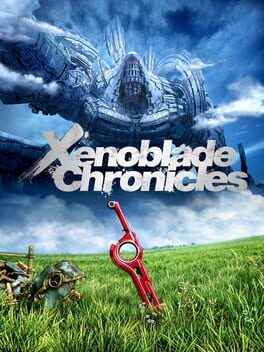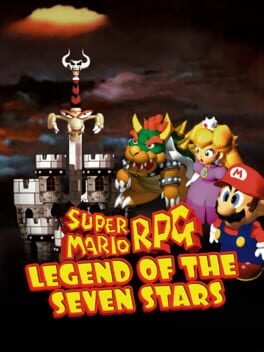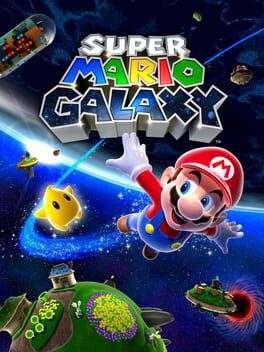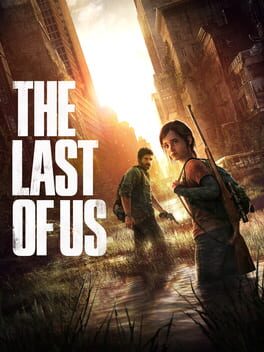CakeTheDog
Bio
gex
gex
Badges

1 Years of Service
Being part of the Backloggd community for 1 year

Best Friends
Become mutual friends with at least 3 others

Noticed
Gained 3+ followers

GOTY '22
Participated in the 2022 Game of the Year Event

N00b
Played 100+ games

Donor
Liked 50+ reviews / lists

Roadtrip
Voted for at least 3 features on the roadmap
Favorite Games
111
Total Games Played
000
Played in 2024
060
Games Backloggd
Recently Played See More
Recently Reviewed See More
This review contains spoilers
I have so much to say about this game that reviewing each individual part of it is impossible. At its core, it takes a huge amount of risks, which both makes it a fresh new take on a standard story format, much like the original, but also appear in places where they probably shouldn’t. This and an often disjointed feeling are the cost of a story that feels legitimately fresh, yet strongly classical, one that is not afraid to try new and innovative methods, many of which work only in the video game medium.
However, this game is not without its faults. As mentioned before, it often feels loosely planned, evident most clearly through the epilogue chapter. Santa Barbara is conceptually strong and amazing as a level, but somewhat weak in terms of pacing. After Abby and Ellie’s fight, ending on the farm would feel unsatisfying, and ending in Santa Barbara feels rushed. Not enough time was spent fully justifying her decision. Not enough time as a whole was spent on the chapter, time that probably should’ve been relocated from some of the less important parts in Seattle. However, the ending itself was incredibly strong, and perfectly bittersweet. Ellie leaves the farm, and despite nearly trying to kill Abby, could not have saved her and Lev without being there to do so. She is forced to move on, much as she helps Abby and Lev do.
My only other complaint is that the story often has odd absences of logic that hurt its continuity. Tommy is shot in the head, point blank, and miraculously survives to majorly advance the plot. When other characters are ruthlessly killed for similar offenses, having one survive such is a jarring inconsistency that cannot be overlooked.
Everything else about the game, though, works out pretty well. The combat and traversal in particular are huge steps up from the first game, the former allowing a huge degree of player expressiveness and creativity, while the latter is made much more entertaining by clear Uncharted 4 influence. The story uses its dual narratives well, although I felt Abby’s Seattle narrative and Ellie’s second narrative were slightly weaker than the incredible start to the game that is the prologue and Ellie’s Seattle.
However, despite these occasional lapses in consistency, this game is something new, something fresh, an ambitious narrative that has changed the way people look at stories in gameplay. Such is visible in the way that combat develops through the game, first motivated by the player wanting revenge, much as Ellie did, then turning into a necessity as she is guided along by her PTSD and pressure from Tommy. Moments like these are especially visible in the fights between Abby and Ellie, tough moments that disconnect the player from their character, as Ellie similarly loses herself.
In the end, I don’t think this game is about revenge, rather empathy. If that was the case, it would end on a much darker note, and we would not be put through Abby’s ordeal, as the cost of revenge could be communicated through Ellie alone. The realization that Ellie must let Abby live, despite what she meant to her, is the moment this game is building to. If all this is what was needed for her to achieve empathy, that was a price that needed to be paid so she did not go down the path Joel did in the years between the first game. Through this message, we are taught to rethink the first game, and morality as a whole. These messages go far beyond revenge, and I think saying that’s all they were going for is underselling it, much as one could undersell the first game by ignoring the authentic emotions each of its scenes are crafted with.
While The Last of Us 2 is not as airtight and refined as it’s predecessor, the risks and innovation shown in its story, the sheer fun of its gameplay, and the introspective link made between the two make it an experience to remember.
However, this game is not without its faults. As mentioned before, it often feels loosely planned, evident most clearly through the epilogue chapter. Santa Barbara is conceptually strong and amazing as a level, but somewhat weak in terms of pacing. After Abby and Ellie’s fight, ending on the farm would feel unsatisfying, and ending in Santa Barbara feels rushed. Not enough time was spent fully justifying her decision. Not enough time as a whole was spent on the chapter, time that probably should’ve been relocated from some of the less important parts in Seattle. However, the ending itself was incredibly strong, and perfectly bittersweet. Ellie leaves the farm, and despite nearly trying to kill Abby, could not have saved her and Lev without being there to do so. She is forced to move on, much as she helps Abby and Lev do.
My only other complaint is that the story often has odd absences of logic that hurt its continuity. Tommy is shot in the head, point blank, and miraculously survives to majorly advance the plot. When other characters are ruthlessly killed for similar offenses, having one survive such is a jarring inconsistency that cannot be overlooked.
Everything else about the game, though, works out pretty well. The combat and traversal in particular are huge steps up from the first game, the former allowing a huge degree of player expressiveness and creativity, while the latter is made much more entertaining by clear Uncharted 4 influence. The story uses its dual narratives well, although I felt Abby’s Seattle narrative and Ellie’s second narrative were slightly weaker than the incredible start to the game that is the prologue and Ellie’s Seattle.
However, despite these occasional lapses in consistency, this game is something new, something fresh, an ambitious narrative that has changed the way people look at stories in gameplay. Such is visible in the way that combat develops through the game, first motivated by the player wanting revenge, much as Ellie did, then turning into a necessity as she is guided along by her PTSD and pressure from Tommy. Moments like these are especially visible in the fights between Abby and Ellie, tough moments that disconnect the player from their character, as Ellie similarly loses herself.
In the end, I don’t think this game is about revenge, rather empathy. If that was the case, it would end on a much darker note, and we would not be put through Abby’s ordeal, as the cost of revenge could be communicated through Ellie alone. The realization that Ellie must let Abby live, despite what she meant to her, is the moment this game is building to. If all this is what was needed for her to achieve empathy, that was a price that needed to be paid so she did not go down the path Joel did in the years between the first game. Through this message, we are taught to rethink the first game, and morality as a whole. These messages go far beyond revenge, and I think saying that’s all they were going for is underselling it, much as one could undersell the first game by ignoring the authentic emotions each of its scenes are crafted with.
While The Last of Us 2 is not as airtight and refined as it’s predecessor, the risks and innovation shown in its story, the sheer fun of its gameplay, and the introspective link made between the two make it an experience to remember.
The game is a simple but moving story that’s told flawlessly. It’s emotionally moving in a way incredibly few video games are. That’s a quality that makes any title a masterpiece in its own right. Honestly, it shouldn’t have gotten a sequel. Everything here is so self contained and amazing that they should’ve put effort into doing a new standalone story of this quality, because the ending is perfect and probably should’ve been left alone. This is why the sequel is fundamentally flawed.
I think people really downplay the gameplay here. The core mechanics are plain fun and the weapon progression is perfect. Add a neat crafting system on the side and you’ve got an entertaining shooter that helps break up story sections. The environmental puzzles, on the other hand, are much more flawed, at least in my eyes. Quite a few of them were interesting, but some were just moving a ladder from point A to B. This is much more suited to a traversal-focused game like Uncharted, where a slower pace of exploration breaks up the fast paced climbing parts. But honestly, it’s not a big deal, and I’m not sure if I’d remove them from the game given the choice. The second game’s traversal blows this out of the water with its insane rope puzzles. As you can probably tell, I have a lot of mixed feelings towards the second game.
On an unrelated side note, I thought the HBO show did a good job adapting the story, even if it’s inherently weaker outside of the video game medium. I think that speaks for how miraculous the final product here is, how well everything fits together. The adaptation was very high quality, though, and I appreciated the new content it offered. I’d probably give it something like a 4/5.
I think people really downplay the gameplay here. The core mechanics are plain fun and the weapon progression is perfect. Add a neat crafting system on the side and you’ve got an entertaining shooter that helps break up story sections. The environmental puzzles, on the other hand, are much more flawed, at least in my eyes. Quite a few of them were interesting, but some were just moving a ladder from point A to B. This is much more suited to a traversal-focused game like Uncharted, where a slower pace of exploration breaks up the fast paced climbing parts. But honestly, it’s not a big deal, and I’m not sure if I’d remove them from the game given the choice. The second game’s traversal blows this out of the water with its insane rope puzzles. As you can probably tell, I have a lot of mixed feelings towards the second game.
On an unrelated side note, I thought the HBO show did a good job adapting the story, even if it’s inherently weaker outside of the video game medium. I think that speaks for how miraculous the final product here is, how well everything fits together. The adaptation was very high quality, though, and I appreciated the new content it offered. I’d probably give it something like a 4/5.
This review contains spoilers
The genius of this game doesn’t fully hit you until the final mission. Specifically, when Dutch walks out of the hideout and, after all these years, delivers a handful of lines and leaves.
Up until this moment, my impression of the game was that the first four chapters were perfect, while everything else was incredibly mixed. This ended up being a fraction of the full story.
But seriously, how could you dislike the first half of this game? While the prologue is slow, Valentine is perfection, easily the best chapter, with entertaining missions all around and an incredibly engaging town despite its simplicity. Rhodes is a major change of pace, but the missions stay fun and the ending is incredible, with Sean’s death a huge shock and the manor raid a huge payoff. Saint Denis is where the game truly opens up, giving players a full city to explore, and some of the craziest missions yet.
And then Guarma hits.
This chapter is often disliked by fans of the game. When I hit it, I ran through it, enjoying the change of pace and excess of combat that came with it, but found the story odd and out of place. However, the payoff of returning to Unshaken and the madness that followed made everything worth it.
Beaver Hollow was also a mixed bag, starting off strong but quickly devolving into anticlimactic resolutions as the story got more and more insane, at least on paper. But yet again, an incredible climax saves it from being too far gone.
The epilogue felt refreshing for the first half and tiring for most of the second. However, American Venom changed everything. This mission I believe is key to understanding this game’s best trick in storytelling.
When we meet Dutch again, we can understand him more than ever before. His desire for the exciting life of an outlaw and hatred of order in America we can relate to, because we just played through hours of honest work that everyone considers far inferior to the gunslinging experienced in former chapters and for a brief moment in the first part of the epilogue. Furthermore, we get his desire to stay criminals, as anyone committing crimes for fun in the game will. We understand his confusion over loyalty because we experienced it with Arthur. To an extent, we understand his mixed character, as Arthur was the same, at least to many players. This moment recontextualizes everything, and solves the character of Dutch after so many chapters of confusion.
Guarma’s purpose, at least to me, is to transition the focus of the story from a character study on Arthur to a character study on Dutch, albeit one through the lens of Arthur, being our protagonist. In Guarma, we see Dutch’s determination evolve as he is challenged alongside Arthur, bridging the gap between the two. By the end of it, their merciless kills done on the island are comparable. Both understand they did what they had to, for a brief period, despite small discourse.
After Guarma, Dutch is presented as distant. At first, he seems to be an enemy of the player, Arthur, who betrays him after years of loyalty. In the epilogue, Dutch truly is distant, more literally represented this time. The disloyalty of Arthur to Dutch and the reverse are juxtaposed with one another. Similarly aligned are the distances between Dutch and John, as well as the opposite.
But when Dutch comes back, years later, we get who he is as soon as he kills Micah. He is the will of the player, or even a mirrored version of it. Ever since Guarma, the game comes to showcase him in a more untamed and honest light, mirroring the player, who may have spent chapters on low honor just to level things up at the last moment. Dutch is the opposite, starting by masking his intentions, then devolving into his honest self. In Guarma, we see it emerge, and after, we see it in full force.
When Dutch returns, we understand that he didn’t simply go insane, although the game cleverly drops red herrings for this in his repeated head injuries. Dutch was and always will be the person he was, and his intentions were cemented in his own moral plan, even if to the outside world the opposite was true. In the one moment that Dutch has utterly no idea what to do, we realize the purpose of the past few chapters, to fully make us understand the realism of his actions, of his downfall. From an objective point, we see Micah as a skilled fighter, one of the few that supported and recognized Dutch’s vision, having known his real one for so long. However, we also understand his confusions over loyalty, the same ones Arthur experienced with him. And in the end, Dutch adheres to both these visions, killing for the loyalty he lived and killed by, which he quite literally said he would do on the return from Guarma. This inner battle represents what Arthur and Micah do - his conflict over loyalty and his ideals regarding America.
In the end, he chooses loyalty, John being a physical manifestation of loyalty and a reminder of his past failure. His ideals crumble when faced with a friend, unlike what happened with Arthur. This time, he realizes his mistake, and goes on to find people loyal to him that will advance his values honestly, without the distortion of leaving America (which Dutch seemingly never was planning on, having such a stake on crime and the opportunity to leave times over, but that’s another story). Dutch wants people following him that will not go against either of his values, loyal to both him and his cause. This leads to his role in the first game.
The way I see it, the final scene reinforces that Arthur and Micah are mere vessels for exploring Dutch. His decision to hold true both of his values, and carry on his dedication to loyalty while also promoting his cause, is the redemption mentioned in the title, culminating with shooting Micah and giving John the money (which he could have had all along, also another story).
Maybe I’m being delusional or spouting nonsense, but I hope that represents well how I saw what is, in my opinion, the greatest ending of all time in a video game.
You can say this game has mediocre combat, say it’s too immersive at the cost of player experience, any of that. People sure did when it released. But the way I see it, this is the best story in a video game, with numerous layers to dissect and the richest characters I’ve seen in the medium. And despite its flaws, I don’t think anything can take that away.
Up until this moment, my impression of the game was that the first four chapters were perfect, while everything else was incredibly mixed. This ended up being a fraction of the full story.
But seriously, how could you dislike the first half of this game? While the prologue is slow, Valentine is perfection, easily the best chapter, with entertaining missions all around and an incredibly engaging town despite its simplicity. Rhodes is a major change of pace, but the missions stay fun and the ending is incredible, with Sean’s death a huge shock and the manor raid a huge payoff. Saint Denis is where the game truly opens up, giving players a full city to explore, and some of the craziest missions yet.
And then Guarma hits.
This chapter is often disliked by fans of the game. When I hit it, I ran through it, enjoying the change of pace and excess of combat that came with it, but found the story odd and out of place. However, the payoff of returning to Unshaken and the madness that followed made everything worth it.
Beaver Hollow was also a mixed bag, starting off strong but quickly devolving into anticlimactic resolutions as the story got more and more insane, at least on paper. But yet again, an incredible climax saves it from being too far gone.
The epilogue felt refreshing for the first half and tiring for most of the second. However, American Venom changed everything. This mission I believe is key to understanding this game’s best trick in storytelling.
When we meet Dutch again, we can understand him more than ever before. His desire for the exciting life of an outlaw and hatred of order in America we can relate to, because we just played through hours of honest work that everyone considers far inferior to the gunslinging experienced in former chapters and for a brief moment in the first part of the epilogue. Furthermore, we get his desire to stay criminals, as anyone committing crimes for fun in the game will. We understand his confusion over loyalty because we experienced it with Arthur. To an extent, we understand his mixed character, as Arthur was the same, at least to many players. This moment recontextualizes everything, and solves the character of Dutch after so many chapters of confusion.
Guarma’s purpose, at least to me, is to transition the focus of the story from a character study on Arthur to a character study on Dutch, albeit one through the lens of Arthur, being our protagonist. In Guarma, we see Dutch’s determination evolve as he is challenged alongside Arthur, bridging the gap between the two. By the end of it, their merciless kills done on the island are comparable. Both understand they did what they had to, for a brief period, despite small discourse.
After Guarma, Dutch is presented as distant. At first, he seems to be an enemy of the player, Arthur, who betrays him after years of loyalty. In the epilogue, Dutch truly is distant, more literally represented this time. The disloyalty of Arthur to Dutch and the reverse are juxtaposed with one another. Similarly aligned are the distances between Dutch and John, as well as the opposite.
But when Dutch comes back, years later, we get who he is as soon as he kills Micah. He is the will of the player, or even a mirrored version of it. Ever since Guarma, the game comes to showcase him in a more untamed and honest light, mirroring the player, who may have spent chapters on low honor just to level things up at the last moment. Dutch is the opposite, starting by masking his intentions, then devolving into his honest self. In Guarma, we see it emerge, and after, we see it in full force.
When Dutch returns, we understand that he didn’t simply go insane, although the game cleverly drops red herrings for this in his repeated head injuries. Dutch was and always will be the person he was, and his intentions were cemented in his own moral plan, even if to the outside world the opposite was true. In the one moment that Dutch has utterly no idea what to do, we realize the purpose of the past few chapters, to fully make us understand the realism of his actions, of his downfall. From an objective point, we see Micah as a skilled fighter, one of the few that supported and recognized Dutch’s vision, having known his real one for so long. However, we also understand his confusions over loyalty, the same ones Arthur experienced with him. And in the end, Dutch adheres to both these visions, killing for the loyalty he lived and killed by, which he quite literally said he would do on the return from Guarma. This inner battle represents what Arthur and Micah do - his conflict over loyalty and his ideals regarding America.
In the end, he chooses loyalty, John being a physical manifestation of loyalty and a reminder of his past failure. His ideals crumble when faced with a friend, unlike what happened with Arthur. This time, he realizes his mistake, and goes on to find people loyal to him that will advance his values honestly, without the distortion of leaving America (which Dutch seemingly never was planning on, having such a stake on crime and the opportunity to leave times over, but that’s another story). Dutch wants people following him that will not go against either of his values, loyal to both him and his cause. This leads to his role in the first game.
The way I see it, the final scene reinforces that Arthur and Micah are mere vessels for exploring Dutch. His decision to hold true both of his values, and carry on his dedication to loyalty while also promoting his cause, is the redemption mentioned in the title, culminating with shooting Micah and giving John the money (which he could have had all along, also another story).
Maybe I’m being delusional or spouting nonsense, but I hope that represents well how I saw what is, in my opinion, the greatest ending of all time in a video game.
You can say this game has mediocre combat, say it’s too immersive at the cost of player experience, any of that. People sure did when it released. But the way I see it, this is the best story in a video game, with numerous layers to dissect and the richest characters I’ve seen in the medium. And despite its flaws, I don’t think anything can take that away.





